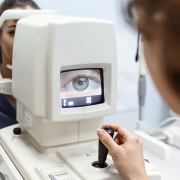Night Vision After LASIK: What You Need to Know
LASIK surgery has been a life-changing procedure for many people who have struggled with the need for glasses or contact lenses. One question that often comes up is how LASIK surgery can affect night vision. In this post, we will explore night vision after LASIK and what ypu need to know.
How LASIK Affects Night Vision
LASIK surgery can cause temporary side effects that affect night vision, such as halos, glare, and starbursts. These side effects are most common during the first few weeks after surgery and typically improve over time as the eyes heal. In some cases, these side effects can persist for several months, but they usually resolve on their own.
However, in rare cases, these side effects can be permanent and may require additional treatment. It is important to discuss any concerns about night vision with your eye doctor before undergoing LASIK surgery.
Factors That Can Affect Night Vision After LASIK
Several factors can affect how LASIK surgery impacts night vision, including:
- The severity of your prescription before LASIK: Patients with severe nearsightedness or farsightedness may be more likely to experience night vision side effects after LASIK.
- The size of your pupils: Patients with larger pupils may be more prone to night vision side effects after LASIK.
- The age of the patient: As we age, our eyes may become less able to adapt to changes in light, which can affect night vision after LASIK.
- The quality of the LASIK procedure: The experience and skill of the surgeon performing the LASIK procedure can impact the quality of the results.
Tips for Improving Night Vision After LASIK
If you are experiencing night vision side effects after LASIK, there are several things you can do to improve your vision, including:
- Use lubricating eye drops as recommended by your eye doctor to help reduce dryness and improve comfort.
- Avoid driving at night until your night vision improves.
- Use anti-glare lenses on glasses or sunglasses to reduce glare and improve night vision.
- Consider additional treatments, such as wavefront-guided LASIK, to improve night vision.
Conclusion
Night vision side effects after LASIK surgery are generally temporary and resolve on their own within a few weeks to months. However, it is important to discuss any concerns with your eye doctor to determine if additional treatment is needed. By following the tips above and working closely with your eye doctor, you can improve your night vision after LASIK and enjoy the benefits of clearer vision both day and night.









